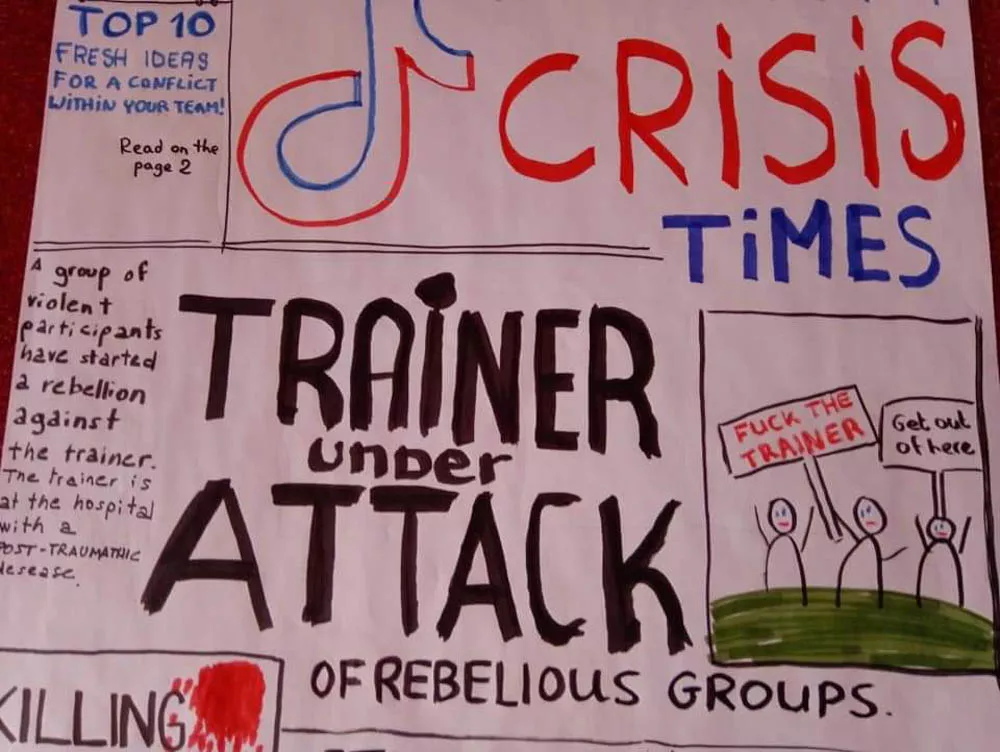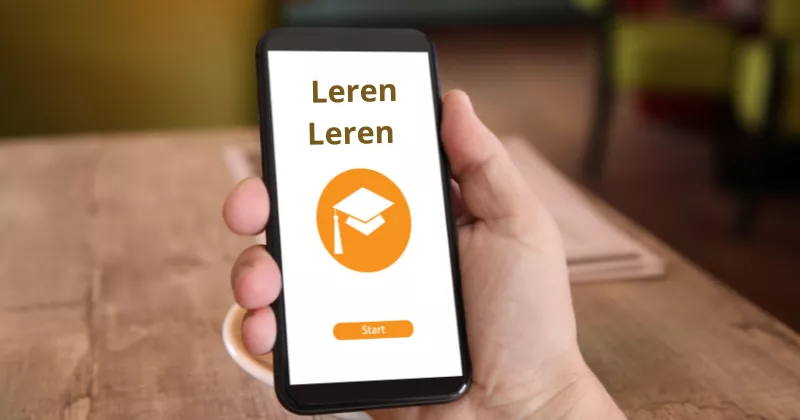Crisis, conflict and trauma during training (part #1)
This article was written when we, as trainers, realized that there are no good trainer resources on how to deal with a crash of a group process during training. We divided our findings into two parts: #1 the theoretical characteristics of crisis, conflict and trauma and #2 (the second part) how to deal with trauma during training.

In a standard curriculum of a train-the-trainer process, you usually have classes on how to prevent difficult situations in training. Do you remember classes that instruct you on what to do in a crisis? It is rather the domain of psychologists and therapists, not trainers.
A facilitator may face situations of crisis, conflict and trauma whilst conducting a workshop. There is no guidance in the manuals for facilitators on how to handle these situations when they actually occur. The purpose of this article is to give an orientation for the initial handling of some of such situations that occur live. Or: The purpose of this article is to fill this gap a little.
As a theoretical framework, the strategic systemic approach is proposed and the concepts of crisis, conflict and trauma are defined. Then some activities are suggested so that the facilitator can handle them. Finally, the scope of this problem and aspects to study, observe and share in the community of facilitators are discussed.
Definition of concepts
Our general framework is the strategic systemic approach, whose authors are, among others, M. Erickson, De Shazer and I. Dolan. One of the models is the Solution-focused brief therapy, evidence-based from decades already.
The solution-oriented approach is a brief and preliminary intervention, although it may be enough. It is applied in a few sessions, actively uses the resources present in the experience and life of a person or group. It concentrates on the future goals and possibilities, built jointly by the facilitator and a person or group. The facilitator assumes the responsibility of empowering a person or group to create and experience their own changes. Solution-oriented interventions are based on a respectful assumption that individuals and groups have internal resources to build effective individual and group solutions to the problems they bring or arise in or between them. The general objectives of the intervention are the following:
- Provide stabilization and relief of symptoms that arise from or are related to conflict, crisis or trauma.
- Alter the feelings associated with the memories of conflict, crisis or trauma, so that these are no longer more intrusive or painfully prevalent in the process of the group.
- Develop a positive, healthy and practical orientation towards the future.
There is a lot of literature and information on the Internet that define these concepts which can approximately be summarized as follows:
|
CRISIS |
CONFLICT |
TRAUMA |
|
The serious and decisive situation that endangers the development of an issue or process. The difficult situation of a person/group. |
Opposition or disagreement between people. They will seek to impose their domain or criteria on a particular object in dispute. |
Very intense shock or emotional impression caused by some negative event or event that produces in the subconscious of a person a lasting imprint that cannot or does not take to overcome. |
|
They are short-lived. |
Punctual, an object matter of discord. The duration of the process will depend on the subjective value assigned to those involved in the thing in dispute and the existing mechanisms for negotiation. |
They last longer. |
|
It is a universal experience, sometimes lived alone. |
More than one person involved. |
It is an individual experience. |
|
The situation is an opportunity. |
Can lead to a different or new paradigm, in case that permanent mechanisms are established to solve it. |
They are negative situations for the person. |
|
|
Power roles. |
Trauma is an event that evokes social roles: "victim", "hero", "relief staff", etc. |
For example, a crisis may occur when one of the participants thinks that the place is uncomfortable or that there is a lot of noise and the rest are not heard. A conflict can arise when a group is divided into two opinions about whether or not the workshop's objectives are being achieved or about different values. Trauma can occur after an activity that is real or imagined way confronts them with a risk of life, such as a physical accident of one or more participants or imagining their own epitaph.
We find working with trauma the most difficult for a trainer, that's why we'll focus on it.
Firstly we would like to define your role in a trauma situation:
- your participants need to feel better than worse after working with you. You don't need to be a therapist. Your role is to take participant out of trauma experience,
- you also have to prevent re-traumatization, which is to return again and again to the experience and the trauma. We want to take the participant out of trauma experience as quickly as possible. He/she may talk about it with a new perspective, but not to come back and be in trauma again.
We invite you to read #2 How to deal with trauma during the training
Authors:
Carlos Bobbert – psychotherapist, trainer and coach. Specialist in the development of talent and strengths. With a lot of experience in experiential education, in companies and public services. Speaking English, Spanish, German and Portuguese, together with having lived and worked in South America and Europe, allows him to support people and organizations in global and intercultural contexts. http://www.carlosbobbert.com/
Aga Leśny - experience designer, trainer. “I base my work on simulation games and outdoor education methods. I am a promoter of ideas and methods of experiential education in Poland. Based on my academic background, I work as an expert in transferring scientific theory into management practice. I have working experience in public administration, cultural institutions, businesses and non-governmental organizations. I am the founder of NGO Pracownia Nauki i Przygody”. www.alesny.pl
Thanks to Joanna Keller (Pracownia Nauki i Przygod) for help within this article.
The article is an outcome of the international seminar “Overwork the process” co-funded by Erasmus+ Programme of the European Union. The project was led by Pracownia Nauki i Przygody (Poland).
Copy free of charge. CC BY NC






